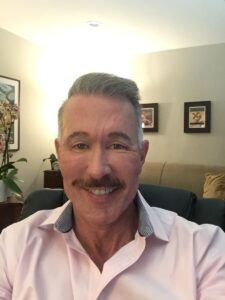
Coping with Sudden Crisis: A Personal Story
Followers of my blog articles and podcast episodes are familiar with my work as a long-term (29 years in 2021) gay men’s specialist psychotherapist, Certified Sex Therapist, and life/career coach. I address many topics about the mental health and well-being of gay men, but I haven’t said that much about myself, but today I’d like to share a more personal story, in the hopes that it supports some of you who might face some kind of similar circumstance.
Experiencing a Sudden Illness
Just a few weeks ago, I was very busy in my daily therapy and coaching practice work, seeing many clients (and couples) in a day, Monday through Friday. However, about 3:00 am on Thursday, October 14, I woke up with very severe chills. At first, I thought I was coming down with COVID-19, despite having had both vaccine shots in January/February and a booster in August (Pfizer). I also had nausea and vomiting. I thought maybe it was the flu, and canceled my sessions that day and the next, a Friday. But then on Friday, I wasn’t much better, so my husband took me to a local urgent care clinic in West Hollywood. I had had some soreness in my left leg. The urgent care clinic was short on staff and didn’t have an ultrasound machine, so they encouraged me to go to a very large hospital nearby in Los Angeles, to their emergency room. I did, and was examined a few hours later. The place was packed with post-COVID patients who had been putting off getting care for non-COVID ailments during the height of the pandemic.
I was diagnosed on the spot by an ER doctor with something called cellulitis, an inflammation/infection of my left leg. I was admitted to the hospital, and then spent the next 10 days there taking strong IV antibiotics. Meanwhile, my lower left leg became very unsightly, let’s say, with blistering and scabbing from the very severe skin infection, not unlike staph infections, for those familiar with those. It was gross, and this was disconcerting to say the least.
Having a good amount of OCD (Obsessive-Compulsive Disorder) in me, the loss of control in the hospital setting was upsetting. They did things so very “by the book,” apparently to avoid what I imagine are constant lawsuits. There were rules around everything. My husband visited daily (bless his heart), but the shift changes of nurses every 12 hours was daunting, having to explain over and over various questions and clarifications, especially about my daily HIV meds, which the hospital pharmacy (MaKami) was actually not that familiar with. I had night sweats at night, and often chills, as my body fought the aggressive infection. At one point, the attending doctors seemed stymied, as this was obviously an unusually severe case of cellulitis, which everything online said would resolve in “about five days” of antibiotics. I was monitored by a kidney doctor (at one point limiting how much water I could drink!), and a vascular surgeon (I had had a blood clot in that leg about eleven years ago, which complicated the situation). But the doctors came and went fast and there was always a paucity of information on what was really going on.
After ten days, the attending infectious disease doctor planned to discharge me to home, arranging for a home health visiting nurse to come in periodically and teach my husband how to continue to give me IV antibiotic infusions for another ten days at home, in addition to a strong oral antibiotic.
As it stands now, I have finished the antibiotic course, and the science experiment that looked like flesh-eating bacteria on my leg is healing with new skin. However, I have had trouble putting weight on my left leg, foot, and ankle, and I have had in-home physical therapy to literally learn to walk again.
I have been off work, texting my clients to keep them up to date, but basically to apologize for my not being available and being on medical leave. I have not left my home since I was discharged from the hospital two weeks ago. We’re working up to that.
Now, I wonder – what have I learned from all this, that I can share with you? I have considered, what are the mental health implications for this situation? How can what I’ve been through help you? This is important to me to try to share.
 I’ve given this some thought, and here’s what I’ve come up with:
I’ve given this some thought, and here’s what I’ve come up with:
- Coping with sudden change – It seems that it’s important in our repertoire of life skills to always be ready for anything. Existentially, we live our lives, we do our jobs, we eat our food, we muddle along, and we follow a lot of routines every day, week, month, and year. And while many or most of us will follow these routines without incident, we have to be ready for “incidents” to happen. A sudden illness. A vehicle accident. Being the victim of violent crime. Experiencing a natural disaster in our home town. The sudden death of a loved one. A household accident, like in the kitchen or the bathroom.
My experience with this illness has taught me that “stuff happens” in life, and my best and only coping strategy has been “radical acceptance” that this has happened/is happening, and it’s thrown my life out of orbit for a while.
- Identifying Supports – I’ve been lucky in that I have a husband of 19 years in 2021 who has been a devoted caretaker, helping me with medications and bringing me meals and drinks because I haven’t been able to walk (except with the use of a walker around my home, and now a cane). The visiting nurse from a home health agency has been a great help as well, and I’ve been fortunate enough that I have private health insurance (a good plan) that covers that, which is why I always recommend buying the very best health insurance you can possibly afford. If I hadn’t had my husband as caretaker, or my home nurse, I would have had to rely on publicly-funded programs, which would have been much more difficult.
Think about your resources. If you were to suddenly become ill, who would take care of you? This is something to think about as part of self-care, and the self-esteem of “loving the self”. If you were ill, a hospital (and probably its social worker) would help arrange for the help and support you needed, depending on where you live.
- Re-Thinking Control – I have always been so “in control.” Running my therapy/coaching practice is running a small business. There are lots of roles, especially in documentation, administration, and accounting. I’m a very organized person with lots of routines and systems that keep my business and my home running smoothly. But this illness has been a hard lesson in learning to cope with “not” being in control. Learning to have a healthy dependence on others who are in the role of helping me to do things I can’t do on my own. Independence is great, but let’s face it, we all live in an inter-dependence on each other in every family, friend network, neighborhood, and community.
- Gaining Perspective – When I was in the hospital, I had such a perspective of just appreciating the simplest things I could have at home, like eating or drinking whatever I wanted. I’ve had to do “sponge baths” because I haven’t been able to stand in my shower. I haven’t been able to stand in my kitchen and cook anything. And just the simple act of going outside my home and walking my dog down my street seems like such a simple, but elusive, pleasure. And that’s before we get to things like going out to a restaurant or a movie. We’ll work up to that.
But things like this, any sudden crisis like the one I’m facing, or maybe ones you’ve faced (or will face) certainly put our minds in perspective about having gratitude for just the simplest joys in life.
- Understanding the Limits of “Prevention” or “Lessons Learned” – I’ve also given a lot of thought to the idea of how this all happened, what kind of “lesson learned for next time” that could prevent something like this, and I come up with nothing. I have a feeling I was exposed to the nasty staph bacteria at my local gym, as the day before this all started I had had an especially hard weight-lifting leg workout. But I can’t prove that, and I really don’t know how I was exposed to the bacteria or how it got in my leg to wreak such havoc.
So, while sometimes we can say we “learned a hard lesson” not to do something (like driving drunk, doing too many drugs, smoking, drinking too much, etc.) there are other situations (many, really) where there is no “lesson to be learned”. There was no “oh, I’ll know better for next time.” I can say, I’m very reluctant to return to my gym anytime soon (not that I even could, physically), but I don’t want to be away from gyms forever just because I might have gotten exposed to this nasty bug there. Or people who have been the victim of freak accidents or even violent crimes or natural disasters don’t really have a “lesson learned.” Shit happens, and that’s been a profound existential lesson in all this.
- Life Will Understand – Part of what’s been hard about this is not being available to my regular roster of clients, individuals and couples, therapy and coaching, worldwide, during my medical leave. I feel guilty for not being the supportive resource that therapy and coaching can be. But I’ve been in touch with all of them, and they all have expressed understanding and wished me well. I’ve been working very diligently this year, not taking a vacation except for one brief week, and yet I’ve been out of work for three weeks. It’s ironic that I never would have voluntarily taken a three-week vacation absence from my practice, and yet now that I’ve been forced to, somehow the world still goes round. This has been a lesson I’ve learned, that no matter what happens, life does go on. Having had a very diligent personal finance savings plan has helped, which makes me grateful I have had the self-discipline to do that, which I encourage everyone to do as part of their “financial self-care.”

What Next?
I don’t know exactly what’s next. But, when in life do we ever know this? My general plan has something to do with recovering from this illness and being on a somewhat structured path of physical rehabilitation to try to work my way back to normal life in terms of walking and working. I’m starting back with limited client sessions just on the phone, because I’ve lost a lot of weight and really don’t look “presentable” for Zoom sessions yet. Plus I can’t sit at my desk for long periods without my foot and leg being really sore. But I’ll get there.
I’m not sure if my “content audience” will get much from this, but I wanted to share my perspective. This has all been humbling, more than a little frightening, and certainly put things in perspective. Certainly, it teaches to “appreciate the little things” that we take for granted, even in the most routine of days or weeks. What I think I’m looking forward to the most is just rehabilitating back into my familiar, and yet newly-cherished, routines of daily life.
Life is a journey, and sometimes we all stumble on the road. Maybe the lesson is in how we get back up again. I’ll keep you posted.
 Ken Howard, LCSW, CST has been a gay men’s specialist therapist for over 29 years, and is an AASECT-Certified Sex Therapist, and life/career/executive coach in full-time private practice, based in West Hollywood (Los Angeles) California. For more information on psychotherapy or coaching services, email Ken@GayTherapyLA.com, or call/text 310-339-5778.
Ken Howard, LCSW, CST has been a gay men’s specialist therapist for over 29 years, and is an AASECT-Certified Sex Therapist, and life/career/executive coach in full-time private practice, based in West Hollywood (Los Angeles) California. For more information on psychotherapy or coaching services, email Ken@GayTherapyLA.com, or call/text 310-339-5778.


